|
|
|
Sort Order |
|
|
|
Items / Page
|
|
|
|
|
|
|
| Srl | Item |
| 1 |
ID:
160787
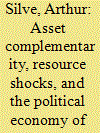

|
|
|
|
|
| Summary/Abstract |
Collaboration between two groups that may invest their resources in a common productive activity has the potential to lead to conflict over the output of that activity. This article examines the stakes of such conflict as well as the willingness for parties to subject themselves to a third-party arbiter. The model highlights three determinants of conflict and of investment in credibility-enhancing institutions: the value of the output, the relative endowments of the parties, and the mutual benefits of collaboration. In particular, the analysis shows that complementarity between the groups’ resources lowers the stakes of political conflict and increases the incentives to commit. The model thus suggests a new mechanism through which we can understand the frequency of conflict and the poor institutions associated in countries with mineral resources. The model’s predictions also help us to understand how Mauritius avoided the resource curse and was able to develop sustainable economic growth.
|
|
|
|
|
|
|
|
|
|
|
|
|
|
|
|
| 2 |
ID:
112541
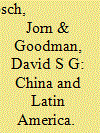

|
|
|
|
|
| Publication |
2012.
|
| Summary/Abstract |
The rise of China is not a new phenomenon. The PRC's growing economic (and in a number of cases also political) involvement in Southeast
Asia and particularly in sub-Saharan Africa has caught the attention of
academics and policymakers alike. However, China's emergence as an
important actor in Latin America has only recently appeared on the radar
screen of the scholarly community and is still an under-researched area.
Eight years have passed since Chinese President Hu Jintao's first tour of
Latin America in November 2004, marking the beginning of a new phase
in Beijing's trans-Pacific relations. The significant boost in Chinese-Latin
American trade provides strong evidence for the importance of this
emerging pattern of interaction. China's trade with the region reached
180 billion USD in 2010, evincing not only an increase of 50 per cent
from 2009 but also a pattern of sharp growth since 2000, when the China-Latin America trade volume stood at just 13 billion USD. By 2007
bilateral trade had already exceeded Hu's original target of 100 billion
USD, set for 2010 (China Daily 2011; Xinhua 2008). The articles in this
issue of the Journal of Current Chinese Affairs bear strong witness to the fact
that this budding relationship has been driven mainly by a mutual desire
to accelerate economic exchange.
|
|
|
|
|
|
|
|
|
|
|
|
|
|
|
|
| 3 |
ID:
087291
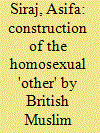

|
|
|
|
|
| Publication |
2009.
|
| Summary/Abstract |
Islam's explicit condemnation of homosexuality has created a theologically based homophobia which engenders the intolerance of homosexuals by Muslims. In this article I explore Muslim attitudes towards homosexuality and homosexuals as this area has elicited very little research. Based on structured interviews with 68 Muslim male and female heterosexuals I examine the connection between participants' attitudes towards homosexuality and their understanding of gender and gender roles. I also analyse whether participants' views are shaped by their religious beliefs and values. Age, gender, education and level of religiosity are analysed to see whether they affect attitudes. Data suggest that participants held negative attitudes towards homosexuals and this is the result of being religiously conservative in their attitudes towards homosexuality and gender roles.
|
|
|
|
|
|
|
|
|
|
|
|
|
|
|
|
| 4 |
ID:
164456
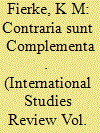

|
|
|
|
|
| Summary/Abstract |
The physicist Niels Bohr identified a parallel between quantum physics and Daoism and Buddhism. This parallel maps onto two debates regarding global IR, on the one hand, and the implications of quantum physics for the social sciences, on the other, highlighting the potential for a conversation between them. The quantum arguments unsettle the hierarchy between “positivists” and “reflectivists,” raising a question of which science, while Daoism and Buddhism, as traditions that have for millennia explored questions of language, agency and ethics, provide a framework for beginning to think about the human and social implications of more recent discoveries in quantum physics. Starting with Bohr's concept of complementarity, the argument moves to an analysis of Karen Barad and Alexander Wendt's work on quantum physics and the social sciences and then explores Bohr's parallel to Daoism and Buddhism. The structuring of the article around a series of oppositions, including particle/wave, ontology/epistemology, materiality/consciousness, egoism/relationality, and East/West highlights the relationship between global entanglement and the constitution of difference with it.
|
|
|
|
|
|
|
|
|
|
|
|
|
|
|
|
| 5 |
ID:
183677
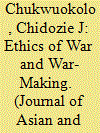

|
|
|
|
|
| Summary/Abstract |
Wars are cataclysmic events that inflict horrendous damage on people and society. In the case of the two World Wars whose magnitudes were global, and manners of prosecution total, this assertion pales in logic. The dangers that a future global war could pose for humanity given the tremendous leaps forward in the science and technology of warfare and weapons since the last World War are tremendous. This paper aims to use the examination of the ethics of war and warfare as backdrop on the analytical assessment of the implications of the exclusion of Africans from both the memorial and monuments that honor soldiers and their service in the two World Wars, even though their service and sundry contributions are salient and tremendous. The paper calls up the issue of racial identity in both Wars in puzzles: Do African soldiers in the Wars share a common humanity with their White counterparts? If they do, another puzzle is the following: Why then is their service still being commodified, to the extent of exclusion in memorials and monuments to soldiers that served and died in both Wars? The damning extrapolation from these puzzles is that there is still the belief albeit erroneous, in the establishment circles that regardless of the facts of history about the Wars, Africans are still viewed as lacking in contributions to the resolution of the threats that the World Wars represented to global peace. To reposition that under laying mind-set, the paper recommends the inclusion of African values of complementarity and inclusiveness in the quest for lasting global peace and the prevention of future Wars.
|
|
|
|
|
|
|
|
|
|
|
|
|
|
|
|
| 6 |
ID:
140279


|
|
|
|
|
| Summary/Abstract |
Status and the relative ranking of states in international politics seem to be salient concerns for most foreign policymakers. Yet, the literature on how status rankings are attributed to states remains as scarce as research on the strategies utilized by states to maintain or enhance the status they are attributed. While there is more research conducted on both status attribution and status competition regarding major powers and rising powers, little systematic attention has focused on the larger population of states in international politics.
|
|
|
|
|
|
|
|
|
|
|
|
|
|
|
|
| 7 |
ID:
143597
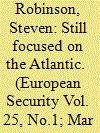

|
|
|
|
|
| Summary/Abstract |
This article examines the limited Europeanization of contemporary Portuguese security policy and highlights how the persistence of North Atlantic Treaty Organisation (NATO) and the emergence of the Lusophone world have shaped Portuguese participation in the European Union's (EU's) Common Foreign and Security Policy in recent years, particularly in Common Security and Defence Policy (CSDP) missions in Africa and in the European Defence Agency's co-operation activities. Europeanization's conceptual weaknesses, combined with the mutually reinforcing nature of transatlantic, EU and Lusophone security co-operation, have reinforced the ambiguous nature of what a “Europeanized” vision for European security might look like, especially given long-standing loyalties to NATO. This affords states considerable margin for manoeuvrability in defining their security priorities, so long as they are seen as being broadly consistent. This article reassesses the appropriateness of the Europeanization concept and shows how Portugal has approached this strategic balancing act, supporting the development of the EU's CSDP whilst remaining loyal to NATO and seeking to develop security relations in the Lusophone world, achieving legitimacy by stressing complementarity and multilateralization in security co-operation.
|
|
|
|
|
|
|
|
|
|
|
|
|
|
|
|
|
|
|
|
|